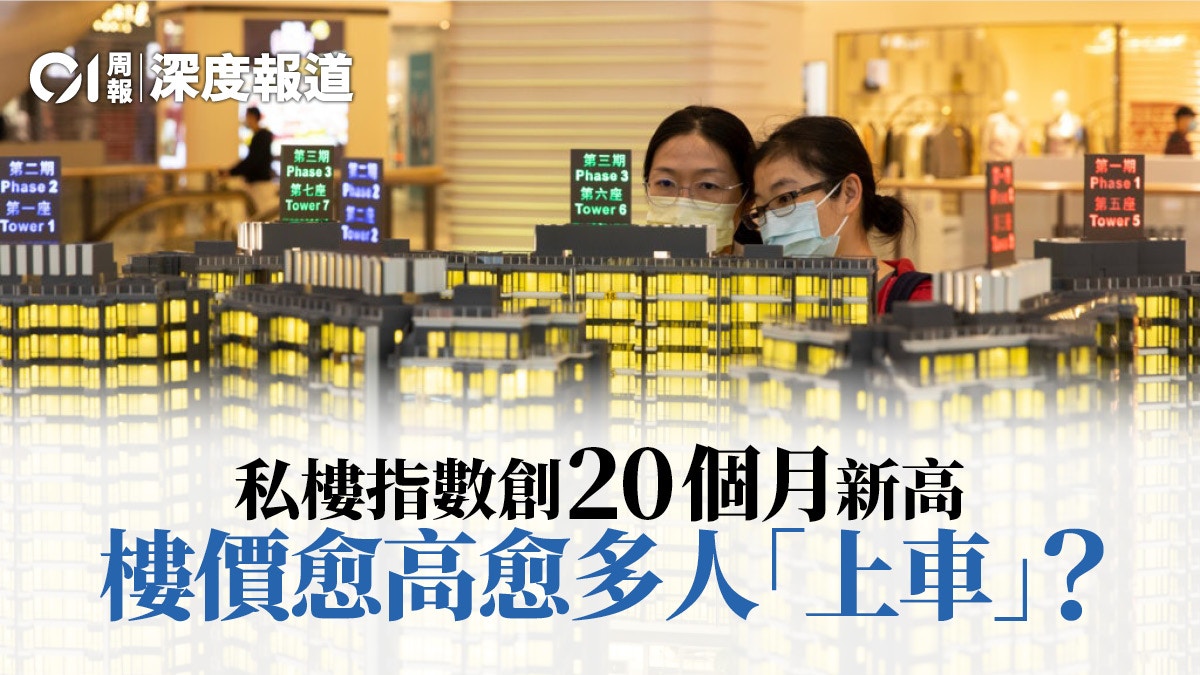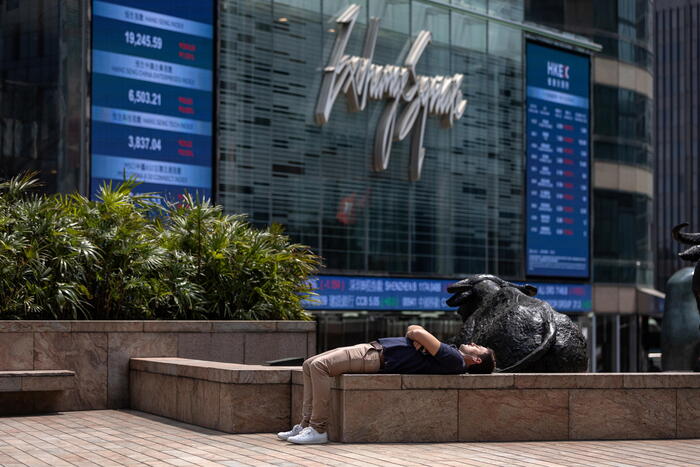weekly
Written by: Yang Yingwei
2021-05-27 18:09
Last update date: 2021-05-27 18:09
At the end of April, Shenzhen’s “one government, one committee and two courts” rarely “changed commanders”. Many analyses pointed out that it was related to the “shenzhen housing management” incident of illegal real estate speculation: the Shenzhen government’s inability to control the inflow of small and micro business loans into the real estate market. Reaching the bottom line of "housing, housing, no speculation," led to high-level intervention.
"Housing, housing, not speculation" was proposed in 2016, setting off a wave of reforms in the mainland's real estate market. At the same time, Hong Kong is still mired in the quagmire of "housing and speculation".
Entering 2021, Vice Premier Han Zheng in charge of Hong Kong and Macao affairs, Xia Baolong, director of the Hong Kong and Macao Affairs Office, and Luo Huining, director of the Liaison Office of the Central Committee of the Communist Party of China, have "named" Hong Kong's land and housing issues.
Recently, it has been rumored that the central government agencies in Hong Kong will conduct large-scale settlement activities before and after "July 1" to visit the basic-level citizens such as subdivided houses and public housing tenants to release their keen concern about the "housing problem."
If the SAR government wants to break the doubts of "loyalty waste" and "rubber stamps", it should start with the "property market" that the central government and citizens are most concerned about, and refer to the Mainland's regulation of "housing, housing, not speculation," and improving governance on land and housing issues. Efficiency, let the house return to the essence of "living".
"What is the real estate market? Where is it?" This is a question that Li Ningyan, an associate professor of the Department of Real Estate and Construction of the University of Hong Kong, asks first-year freshmen every year in the first class.
Li Ningyan wrote at the beginning of his book "The Real Estate that Can’t Escape", if only a group of businessmen and investors in the real estate market are trying to buy, sell and rent to maximize profits, it’s like the "Monopoly" game. Naturally, the real estate market, like other asset markets, can only accommodate commercial, economic, and investment attention. "But we also know that in addition to investment returns, the real estate market has many factors to consider. No one would advocate that the government treat individual listed companies The stock or gold price of China is controlled at a level that is affordable to the public, but some people ask the government to control the real estate market.”
Li Ningyan eloquently explained that real estate is not just as simple as "commodities" and "assets," and its impact on society is by no means only reflected in changes in "amounts."
He pointed out in the book that "housing decisions" are not only about "business", but also about "society":
"Real estate is defined as "buildings and land", so real estate decisions include land use strategies and building use decisions. It also directly or indirectly causes a series of ripple effects related to different areas and networks in society, which obviously includes many socio-economic and even political issues, rather than just being linked to business or investment."
The SAR government should refer to the Mainland's regulation of "housing to live without speculation", and improve the effectiveness of governance on land and housing issues, so that housing can return to the essence of "living".
(Profile picture)
Mainland China cracks down on speculation
From the perspective of social people's livelihood, houses have "use value". In addition to being a habitat for citizens, houses are also closely related to social issues such as education, medical care, and employment.
From a market perspective, housing as a "real estate" also has its "investment value". It is one of the ways for families to resist inflation and even make a profit.
The "use value" and "investment value" of a house correspond to the two purposes of "housing" and "speculation".
Starting from these two values, to understand the mainland’s "housing, not speculation," is to regulate the real estate market, so that market transactions will be guided by "investment value" and return to the general policy direction of "use value". The logical starting point of "speculation".
The term "housing to live without speculation" originated from a paragraph of President Xi Jinping's speech at the Central Economic Work Conference at the end of 2016: "Adhere to the positioning of "houses are for housing, not for speculation." Fiscal and taxation, investment, legislation and other means accelerated research and establishment of basic systems and long-term mechanisms that conform to national conditions and market laws to curb the real estate bubble.” Since then, local governments have launched multi-directional control and structural reforms around the real estate market.
Earlier, the central government announced the "14th Five-Year Plan" and the "Outline of Long-term Goals for 2035", which reiterated "no speculation in housing" and "three stability" (stabilizing land prices, housing prices, and stabilizing expectations).
It can be seen from this that "housing to live without speculation" will be the main axis of China's land and housing policy in the past, present, and even in the future.
"Housing and housing, not speculation" will be the main axis of China's land and housing policy in the past, present, and even in the future.
(Xinhua News Agency)
On the one hand, the Chinese government has cracked down on "speculation"-using "visible hands" to limit consumers' blind pursuit of the "investment value" of housing, and return the housing market to housing demand-oriented transactions.
For example, Shenzhen, where housing prices have soared the most crazily, issued the "strictest purchase restrictions" last year, raising the door to buying houses for Shenzhen residents who have paid social security and income tax for at least three years, or non-Shenzhen residents who have paid social security and income tax for at least five years. In order to combat "real estate speculators".
At the beginning of this year, Shenzhen established the "Reference Price Release Mechanism for Second-hand Housing Transaction" in response to the phenomenon of "housing price upside-down" (meaning that the price of second-hand housing is much higher than the price of first-hand housing), and released the reference price of second-hand housing transactions in residential communities, requiring second-hand housing Intermediaries cannot publish information on housing above the reference price, and banks also issue loans at the reference price.
In early May, the Shenzhen branch of China Construction Bank took the lead in raising interest rates on housing loans. Experts expect other large state-owned banks to follow suit.
Shenzhen is a typical example, but it is by no means a special case. This is true of major cities in the Mainland.
According to statistics from Centaline Real Estate Research Center, as of mid-April, the number of national real estate control policies this year has exceeded 160.
Among them, in March, the number of real estate control policies reached 48 times, surpassing the 45 times in February and the 42 times in January.
Shenzhen is a typical example, but it is by no means a special case. This is true of major cities in the Mainland.
(Reuters)
On the other hand, the government guarantees "housing"—the government participates in the real estate market as a market entity, increases housing supply, strengthens housing protection, and strives to relieve the pressure on housing for the grassroots and relieve the pressure of home ownership for citizens.
Taking Guangdong Province as an example, the provincial government issued the "Fourteenth Five-Year Plan for National Economic and Social Development of Guangdong Province and the Outline of Long-Term Goals for 2035" at the end of April. The hard target of 300,000 sets of rental housing will solve the housing problem of "difficult groups and new citizens" by increasing the supply of welfare housing such as "public rental housing", "talent housing", and "affordable housing".
In terms of home ownership, Guangdong Province launched pilot projects for the construction of “shared property housing” in five cities: Guangzhou, Shenzhen, Zhuhai, Foshan and Maoming as early as 2018.
The so-called "shared property rights" refers to the joint ownership of housing property rights by the government and the purchaser.
This type of housing is supported by government policies and is built by developers. The price will be lower than that of commercial housing in the same location and of the same quality.
Buyers can invest 50% to 80% of the market price to purchase the property rights of this type of house. The property rights of the house are not allowed to be rented or resold within five years. When the property is transferred after five years, the government can give priority to repurchase under the same conditions.
Currently, "shared property housing" is open to urban households without housing such as qualified talents, stable employment migrant workers, Hong Kong and Macao residents working and living in Guangdong, and each family can only purchase one set.
As of the end of June 2020, Guangdong Province has raised a total of 61,000 "shared property houses" and supplied 34,000 sets of "shared property houses".
Beijing, Shanghai, Nanjing and other cities also have pilot projects for "shared property housing".
The government used public finances to intervene in the real estate market, reducing the pressure on low- and middle-income families to buy homes and returning housing to the essence of residence.
The pilot project of Guangzhou's joint-property housing "First Building Garden".
(Online picture)
Hong Kong speculation is hot
In Hong Kong, the housing market is full of weird phenomena, and the rise and fall of housing prices in the city has nothing to do with the fundamental economic situation.
Before this quarter's GDP rebounded, Hong Kong's GDP had fallen for six consecutive quarters due to social movements and the epidemic.
It's just that the worse the economy is, the firmer property prices are.
According to statistics from the Rating and Valuation Department, in March this year, the private residential property price index in Hong Kong reported 388.3, up 0.8% month-on-month and 2.62% year-on-year, setting a new 20-month high.
Among them, the largest increase was for properties over 160 square meters, and the selling price increased by 3.62% from the previous month (see table).
Ironically, the "2021 Hong Kong Property Report" published by the Rating and Valuation Department shows that there were about 53,000 vacant housing units in Hong Kong last year, and the vacancy rate of private buildings reached 4.3%. Among them, small and medium-sized units (category A, B, C) The vacancy rate of properties) is 4%, and the vacancy rate of large-scale units (D and E properties) is 7.3%.
The paradox is that the price of large properties in the real estate market is higher than that of small and medium-sized properties, and the vacancy rate is also higher. However, it is the type of property with the largest price increase, which obviously does not conform to the supply and demand relationship in the market economy. How should this phenomenon be explained?
Li Ningyan explained in the book that in most durable goods markets, consumers will buy more if prices rise and consumers delay consumption. “This is a rational behavior predicted by the law of demand, but it is another time in the real estate market. Things...sometimes there are so-called irrational behaviors."
In the real estate market, consumers will make purchase decisions from two perspectives, one is that the goods can meet the needs of consumption, and the other is the long-term investment effect.
Regardless of whether the owners are for self-occupation or investment, they want to sell in real time or hold for a long time, they all hope that their property will appreciate. On the contrary, they hope to successfully "buy the bottom" when buying.
"Because the lowest price is too difficult to determine, and most people try to minimize the risk. Most people will first make sure that the market is going up before buying a property." When there are enough such people, the overall demand will rise, pushing up housing prices. Property prices will also "like self-fulfilled prophecies, rising as more and more people enter the market."
Therefore, "the increase in market prices is actually consolidating people's purchasing decisions and increasing their desire to buy."
Li Ningyan wrote in the book: "This phenomenon of "low prices means fewer transactions, high prices means more transactions" was caused by the influx of hot money after the outbreak of SARS in 2003 and the global recovery from the financial tsunami in 2009. It happened repeatedly in Hong Kong." (Source)
In his book, Li Ningyan analyzed Hong Kong property data from 1996 to September 1997 and found that this phenomenon is not uncommon: "This phenomenon of "low prices means fewer transactions, high prices means more transactions." In 2003, atypical pneumonia (SARS) ) The raging period and the time when the world recovered from the financial tsunami in 2009, the hot money flowed into Hong Kong.”
Entering 2021, the new crown epidemic has brought about a global economic recession. Western countries led by the United States have implemented monetary easing policies. This has further increased the investment demand for people to purchase real estate to combat currency devaluation. These needs support large-scale "luxury goods". Property prices continue to rise, investment products are not actually used, and there is a high vacancy rate.
It can be said that Hong Kong's property market has fallen into a vicious circle of "real estate speculation". "Investment value" is far better than "use value," and it plays a role in determining prices in the market.
Under the real estate bubble, housing is completely "commodified" into a money game for investors, which also hurts low- and middle-income families who have a rigid demand for housing.
The investigative agency said that an average family of four takes an average of 20.7 years without eating or drinking to purchase a 500-square-foot flat.
According to a report by Demographia, an international survey agency, as of early 2021, Hong Kong has been the world’s most unaffordable place for property prices for 11 consecutive years. It is estimated that an average family of four will take an average of 20.7 years without eating or drinking to purchase a 500-square-foot building. unit.
Professor Tang Xiwei of the School of Economics and Business Administration of the University of Hong Kong mentioned in the article "Hong Kong's Need for the Third Economic Transformation" that in the past two decades, Hong Kong's per capita GDP has increased by 89%, but the median household income has increased by only 63. %, while the value of food exceeded 80%, and housing expenses surged by 306%.
In other words, under the deformed property market, even if employees work hard to go to work, get promoted and raise their salary to contribute value to the city, the accumulation of family assets cannot keep up with the surge in prices, let alone the increase in the assets of the "owners" in their hands. .
When property speculation affects the housing rights of citizens, how does the SAR government respond? How effective is the so-called "hot trick"? For more details, please see the next article:
Housing is not speculation. Next | Establishing a long-term property market regulation mechanism from the problem of land supply destroying housing
The above is excerpted from the 266th issue of "Hong Kong 01" Weekly Report (May 24, 2021) "Compared with the Mainland's "Housing and not speculating" Hong Kong is deeply mired in the "Housing speculation". If you want to read the full text, please
click here to
sample the weekly newsletter and browse more in-depth reports.
Featured content of 266 issue of "Hong Kong 01" Weekly News:
[Cover Report] Is it about to face the end of the frenzy of strict regulation of cryptocurrency?
Five-day holiday drags on for ten years, the government is lazy to deal with the situation of the grassroots
Taiwan Epidemic "New Normal": Relearning how to prevent the epidemic
The distribution of sports resources is severely uneven. Are "non-elite" sports not worth promoting?
Contrast with the mainland's "housing can't live in speculation", Hong Kong is in the quagmire of "housing can't live in speculation"
The property market frenzy The property market in the mainland is a new hot recruit for the property market in China. Real estate hegemony in the Chinese real estate market. Hong Kong Real Estate Dawan District. Shenzhen, Guangdong. Shenzhen. Property Market. Shenzhen Property Prices 01 Weekly Report.




/cloudfront-eu-central-1.images.arcpublishing.com/prisa/3I74UEXLYRBBRPGPSGWNN6WXH4.jpg)


